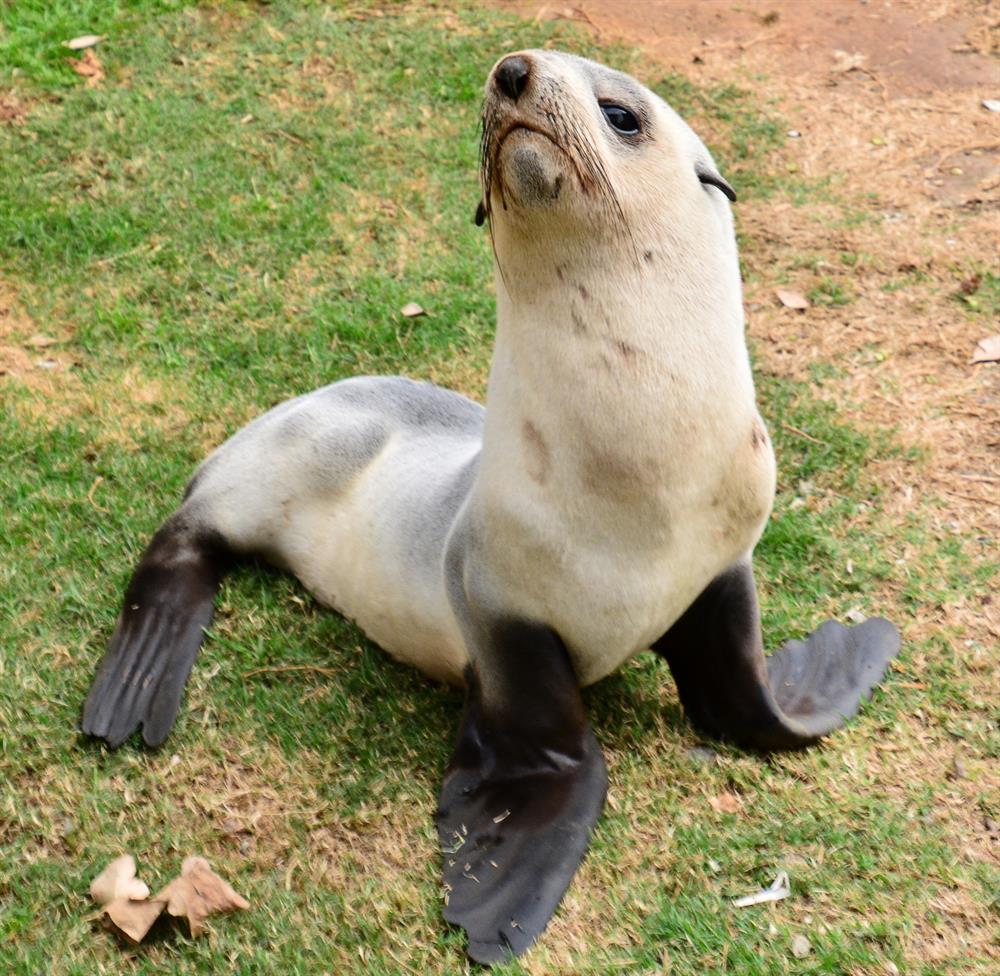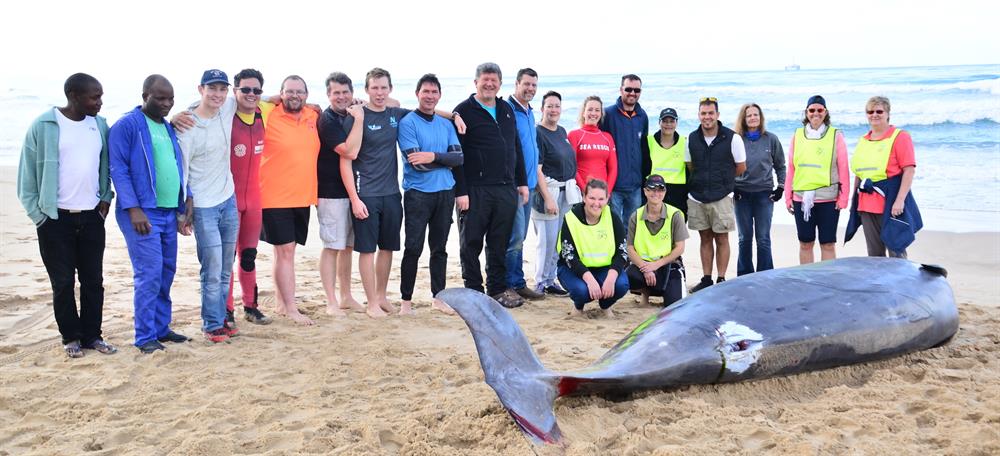Update
MOSSEL BAY NEWS - The past week definitely was very special for all marine mammal lovers as two rare and exciting strandings occurred in the Greater Mossel Bay area.
Antarctic fur seal
On Tuesday 31 July, Stranded Marine Animal Rescue Team (S.M.A.R.T. ) responded to a very weak seal lying on Glentana beach. Volunteers Val Marsh and Rene Hodges responded and rescued the emaciated animal. En route to veterinarian Dr Frans de Graaff, the seal escaped its transport crate, causing chaos in the vehicle.
Safely at the vet's, it was suspected that this was not an ordinary seal, as the colouring and shape of the head was distinctively that of an Antarctic fur seal (Arctocephalus gazelle). A rare occasion, as this was only the second recording of this species stranding on South African beaches and a first for the Southern Cape. The positive identification was done by Pinniped specialist, Dr Greg Hofmeyer from Bayworld. The seal was transported to Bayworld on Wednesday morning.
The Antarctic fur seal is one of nine species of eared seals. They are found on several sub-Antarctic islands, with the largest breeding colony at South Georgia - about 5 000km from Mossel Bay. There are also Antarctic fur seal populations on the South Shetland, South Orkney and South Sandwich islands, as well as Heard Island. Females and juveniles tend to be grey with a lighter belly. At birth the pups are black. Antarctic seals have slanted eyes and feed on moderate sized fish, squid and a lot of krill.
They are threatened by oil spills, overfishing and entanglement in fishing nets. Naturally they are preyed upon by sharks and orcas.
Sylvester, as the juvenile male was named, unfortunately died early on Monday morning, but it still was a privilege to see such a beautiful animal. Dr Hofmeyer performed a necropsy and although there was indication of sickness (pathology test results are awaited), the cause of death is unknown. The reason why Sylvester has come to our beaches remains unknown.
 While the public looked on, S.M.A.R.T. volunteers and Oceans Research interns helped Dr Gwen Penry and the team of the Plett Stranding Network to take measurements and scientific data samples. Photo: Tersia Marais
While the public looked on, S.M.A.R.T. volunteers and Oceans Research interns helped Dr Gwen Penry and the team of the Plett Stranding Network to take measurements and scientific data samples. Photo: Tersia Marais
True's beaked whales
Early on Saturday, 4 August, S.M.A.R.T. was alerted about some sort of mammal lying in the breakers off Little Brak beach. Although its fluke was seen moving, the first responding S.M.A.R.T. volunteers detected no life. Another, smaller mammal, also lifeless, was found about 900 meters away.
The mother and calf were True's beaked whales (Mesoplodon mirus). This was only the second recorded stranding of a mother and calf together of this species in South Africa.
True's beaked whales are extremely rare and as a deep water species, seldom seen, consequently very little is known about them. They are part of the toothed sub order of 15 different whale species in the beaked family. They reach around 5,3m and females on average weigh 1 400kg. The mother on the beach measured 4,8m and the calf 2,4m. Males have distinctive, protruding small teeth set at the end of the beak which are possibly used to establish dominance.
The melon is bulbous with a short beak. Grooves under the throat help to expand their mouths as they catch their prey through suction. They have white and black speckling under the throat and on the fluke. The pectoral flippers are small. They live in really deep water and can dive very deep, which is why they are seldom seen near the shoreline.

Their diet is made up of squid and other cephalopods (octopus or nautilus) and fish. Their biggest threat is entanglement in fishing nets, which causes drowning. Underwater noise and seismic activities can also be harmful to these gentle giants.
More knowledge
Cetacean specialist Dr Gwen Penry and members of the Plett Stranding Network did the scientific sampling and performed full necropsies on both animals. They were assisted by Sascha Dines and other interns from Oceans Research, while volunteers of S.M.A.R.T. kept the public informed.
All data collected went to Bayworld in Port Elizabeth,where it will be kept for further research. Because of this very sad stranding, a little more knowledge about these magnificent animals is now available.

According to Dr Penry, the stomach contents of the mother showed that she has not been feeding recently. No plastic or any other disturbing material was found in the stomachs. Inconclusive, but it could be that she became very weak after giving birth and that lactating the calf whilst battling strong winds and currents, could have caused her death. Although the calf did have some milk in its oesophagus and stomach, it could not survive without its mother at this early stage in its life.
Cooperation
The sad event also demonstrated that organisations can work together and make a difference together.
The Mossel Bay NSRI Station 15 responded and helped to winch the animals higher up on the beach.
The carcasses were protected at night by the Little Brak Neighbourhood Watch and members of the Midbrak Conservancy. S.M.A.R.T. and members of the Plett Stranding Network took hands and worked together while Oceans Research interns did their scientific bit by helping with the sampling and necropsies.
The carcasses were removed by the Mossel Bay Municipality on Wednesday.
 The True's beaked whale calf measured 2,5m and had milk in its oesophagus and stomach. No bite wounds or any signs of injury could be seen. Photos: Tersia Marais
The True's beaked whale calf measured 2,5m and had milk in its oesophagus and stomach. No bite wounds or any signs of injury could be seen. Photos: Tersia Marais
If any suspicious or unnatural marine mammal activities are seen, please do not hesitate to contact S.M.A.R.T. on 072 227 4715 immediately.
With increased demersal-longlining and octopus trapping operations in progress, all marine mammals are in severe danger of entanglement, especially now during whale season when a lot of calves are born. A false alarm call is better than a dead whale lying on a beach.
Read previous articles:
'We bring you the latest Mossel Bay, Garden Route news'















